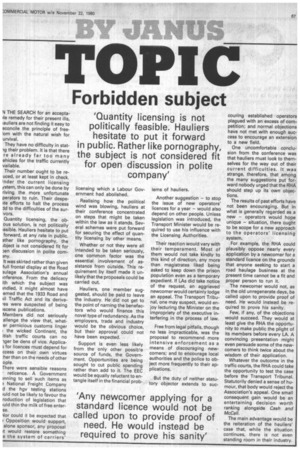T O P IC C
Page 71

If you've noticed an error in this article please click here to report it so we can fix it.
Forbidden subject
'Quantity licensing is not politically feasible. Hauliers hesitate to put it forward in public. Rather like pornography, the subject is not considered fit for open discussion in polite company'
NJ THE SEARCH for an acceptaIle remedy for their present ills, aulie rs are not finding it easy to econcile the principle of freelom with the natural wish for urvival.
They have no difficulty in stat ig problem. It is that there re already far too many ehicles for the traffic currently vail able.
Their number ought to be reuced, or at least kept in check. Inder the current licensing /stem, this can only be done by riving the more unfortunate perators to ruin. Their despe3te efforts to halt the process id to the difficulties of the survors.
Quantity licensing, the obous solution, is not politically .asible. Hauliers hesitate to put forward, at any rate in public. ather like pornography, the lbject is not considered fit for Den discussion in polite corn)ny.
It was skirted rather than given full frontal display at the Road 3 ulage Association's annual )nference. From the delicacy ith which the subject was indled, it might almost have emed that the 1933 Road and il Traffic Act and its derive,es were suspected of being )scene publications.
Members did not seriously allenge the view that, whater pernicious customs linger the wicked Continent, the itish traffic courts can no lger be dens of vice. Applica5 for licences must depend for ccess on their own virtues her than on the needs of other ople.
There were sensible reasons • reticence. A Government inning to sell such items as ) National Freight Company d the hgv testing stations luld not be likely to favour the roduction of legislation that luld thin the milk of free enterse.
%tor could it be expected that Opposition would support, alone sponsor, any proposal it would restore something e the system of carriers' licensing which a Labour Government had abolished.
Realising how the political wind was blowing, hauliers at their conference concentrated on steps that might be taken within the law as it stands. Several schemes were put forward for securing the effect of quantity licensing by other means.
Whether or not they were all intended to be taken seriously, one common factor was the essential involvement of assistance from outside. This requirement by itself made it unlikely that the proposals could be carried out.
Hauliers, one member suggested, should be paid to leave the industry. He did not get to the point of naming the benefactors who would finance this novel type of redundancy. As the employers, trade and industry would be the obvious choice, but their approval could not have been expected.
Support is even less likely from the only other possible source of funds, the Government. Opportunities are being sought to cut public spending rather than add to it. The EEC would be equally reluctant to entangle itself in the financial prob
lems of hauliers.
Another suggestion — to stop the issue of new operators' licences for a year — would also depend on other people. Unless legislation was introduced, the Transport Minister would be required to use his influence with the Licensing Authorities.
Their reaction would vary with their temperament. Most of them would not take kindly to this kind of direction, any more than magistrates liked being asked to keep down the prison population even as a temporary expedient. If LAs did take notice of the request, an aggrieved newcomer would certainly lodge an appeal. The Transport Tribunal, one may suspect, would enjoy lecturing the Minister on the impropriety of the executive interfering in the process of law.
Free from legal pitfalls, though no less impracticable, was the proposal to recommend more intensive enforcement as a means of discouraging newcomers; and to encourage local authorities and the police to object more frequently to their applications.
But the duty of neither statutory objector extends to suc
couring established operators plagued with an excess of competition; and normal objections have not met with enough success to encourage an extension to a new field.
One uncomfortable conclusion from the conference was that hauliers must look to themselves for the way out of their current difficulties. It was strange, therefore, that among the many suggestions put forward nobody urged that the RHA should step up its own objections.
The results of past efforts have not been encouraging. But in what is generally regarded as a new — operators would hope unique — situation, there ought to be scope for a new approach to the operators' licensing system.
For example, the RHA could plausibly oppose nearly every application by a newcomer for a standard licence on the grounds that anyone seeking to start a road haulage business at the present time cannot be a fit and proper person to run it.
The newcomer would not, as in the old unregenerate days, be called upon to provide proof of need. He would instead be required to prove his sanity.
Few, if any, of the objections would succeed. They would at least give the RHA the opportunity to make public the plight of its members before every LA. A convincing presentation might even persuade some of the newcomers to think twice about the wisdom of their application.
Whatever the outcome in the traffic courts, the RHA could take the opportunity to test the case before the Transport Tribunal. Statutorily denied a sense of humour, that body would reject the Association's appeal. One small consequent gain would be an entertaining decision worth ranking alongside Cash and McCall.
The main advantage would be the reiteration of the hauliers' case that, while the situation continues, there is not even standing room in their industry.














































































































